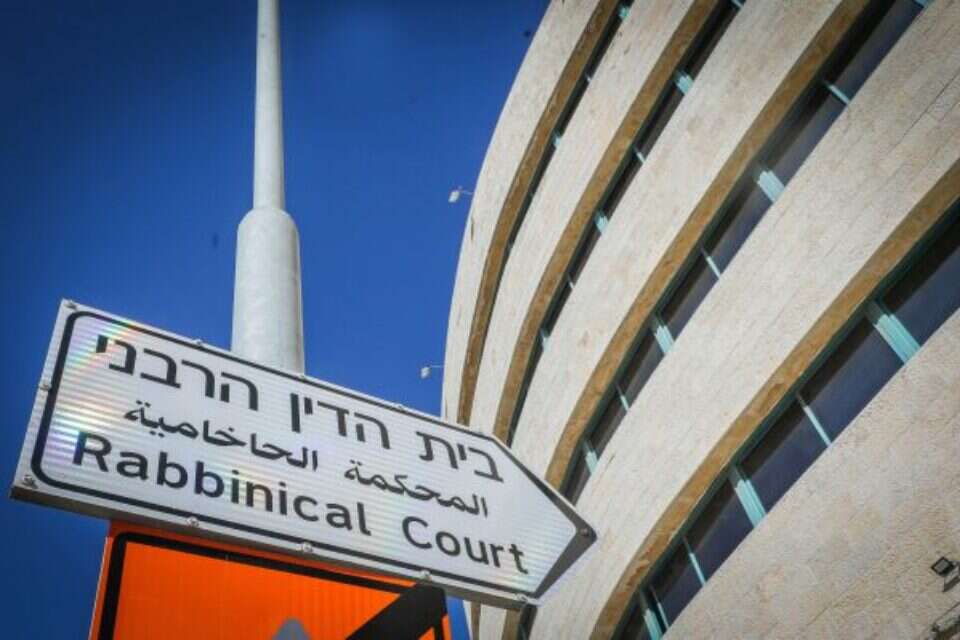The rabbinical court in Petah Tikva launched a frontal battle with the attorney general and ruled, contrary to a Supreme Court ruling, that a couple married in a civil marriage cannot divorce through the court without clarifying the woman's Jewishness.
The judges refused to grant a divorce, stating that they "reject the joint request to dissolve the civil marriage without clarifying the applicants' Jewishness and without a get," and ruled that they could file a new request for divorce and the court would act "in accordance with the guidelines for clarifying Judaism."
Protest in front of the Chief Rabbinate of Tel Aviv // Aviv Hasidov
The couple married in 2012 in a civil ceremony in Cyprus, when they say they were not married in a religious ceremony at all. In 2021, they decided to divorce and held a divorce ceremony through a lawyer, which was approved by the family court. Upon approval of the agreement in court, the applicants turned to the rabbinical court to finalize the divorce.
Here an unexpected twist occurred: minutes after submitting the request to open the case, the woman received a call from the court in which she learned that a legal proceeding had been opened regarding the clarification of her Jewishness. In December of that year, the woman petitioned the court to obtain permission to dissolve the marriage in the family court, or alternatively, to obtain a divorce for her without a preliminary process of clarifying her Jewishness. When she did not get what she wanted, the couple petitioned the High Court of Justice.
The petition was joined by the Attorney General, who argued together with the petitioners that according to the policy that was formulated, women are not required to undergo a process of clarifying Judaism.
, Ashkelon Rabbinical Court.
Last February, the Supreme Court issued a ruling in which the justices ruled that the petitions, filed by the couple and another petition, should be dismissed, because the attorney general's position, which is accepted by the legal counsel for rabbinical jurisdiction, is that the chief rabbinical court should permit the marriage of the petitioners without requiring them to undergo a process of clarifying their Jewishness.
The state's notice to the High Court of Justice states that in accordance with a previous ruling known as the Bassan ruling, in cases where the rabbinical court believes that it cannot determine with certainty which of the litigants is Jewish, but cannot determine that he is not Jewish, it is authorized to decide on the divorce issue and to arrange a divorce – even if the litigant has not been given a Jewish inquiry. However, the rabbinical court will note in the divorce certificates that his Jewishness according to halacha was not clarified by the rabbinical court.
The couple returned to the rabbinical court in Petah Tikva and asked for a divorce. "It is a basic principle that civil marriage, out of choice and desire to marry outside the religion of Moses and Israel, is considered a marriage contrary to Jewish law," the couple wrote to the court.
Attorney General Baharav-Miara, Photo: Yehuda Ben Yattach
"Since these spouses do not want halakha, the marital relationship between them is intended to sustain a family that is not in accordance with halacha. In this situation, a divorce is not required from the husband's hand to the wife. The marriage can be dissolved by issuing a divorce decree. The court clarified that there is a halachic possibility of dissolving a marriage without a divorce, and the Supreme Court ruled that this is the path that the court must take in the case of unmarried spouses."
However, the rabbinical court refuses to grant a divorce to the couple. According to the judges, it is unclear whether what was written by the High Court of Justice has the status of the ruling, and the guidelines for clarifying Judaism in connection with divorce have not been changed. When approached by the attorney general, the ruling said, "the attorney general did not respond to the court's questions in the interim decision, certainly not directly and clearly. With all due respect, the counselor answered questions we didn't exactly ask, and expressed a position on an issue for which we didn't really ask for her to appear."
In addition, the couple "did not bother to claim in the pleadings they submitted to us that they are Jewish, and it is not clear why. The applicant openly declares that she refuses the court to clarify her Jewishness."
Rabbinical Court. The subject has nothing to do with the article, Photo: Oren Ben Hakon
The judges added that "prima facie, the applicants believe that they are exempt from acting according to the court's procedures, which require clarification of Judaism for spouses who were not married in Israel."
The judges criticize the attorney general quite a bit, and finally write that if she wants to reduce the Sen ruling to narrower boundaries, "for this purpose an explicit ruling by the Supreme Court or a legislative amendment is needed."
"It therefore appears that the normative situation prior to the High Court ruling in the case of the applicants has not changed. The court must verify the Jewishness of the litigants before resorting to an agreed request for divorce. Divorce in the court of spouses one or both of whom is not "certainly Jewish" will be conducted in a proceeding according to the Jurisdictional Dissolution of Marriage Law (Special Cases) and not according to the Rabbinical Courts Jurisdiction Law (Marriage and Divorce)," the judges concluded, ruling that they reject the request for dissolution of marriage without clarifying Judaism and without a divorce, and clarified that the couple may file a new request for divorce, and the court secretariat will act in accordance with the guidelines for clarifying Judaism.
Wrong? We'll fix it! If you find a mistake in the article, please share with us

